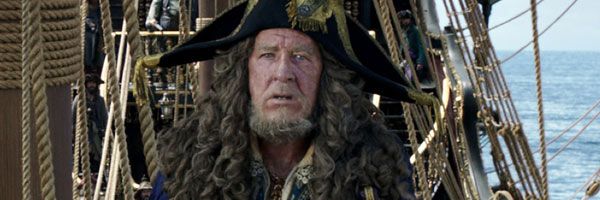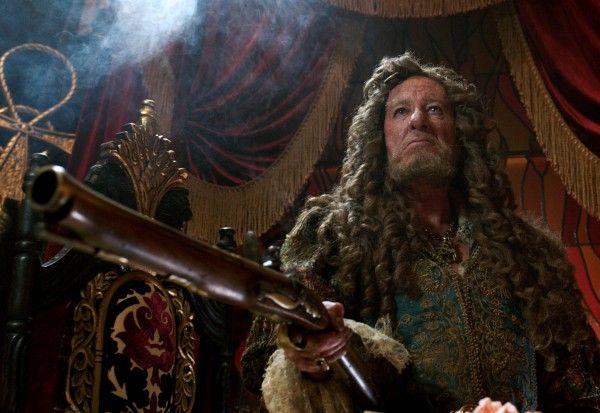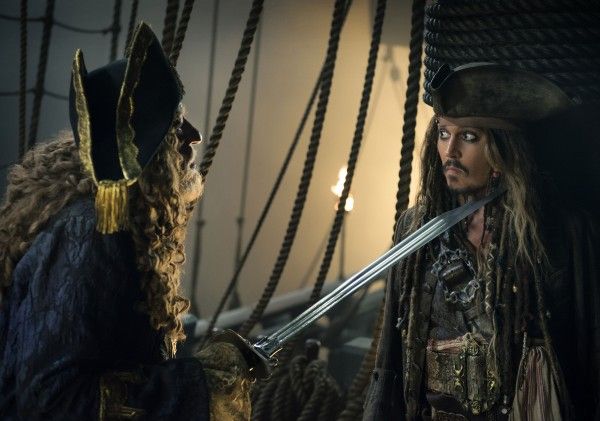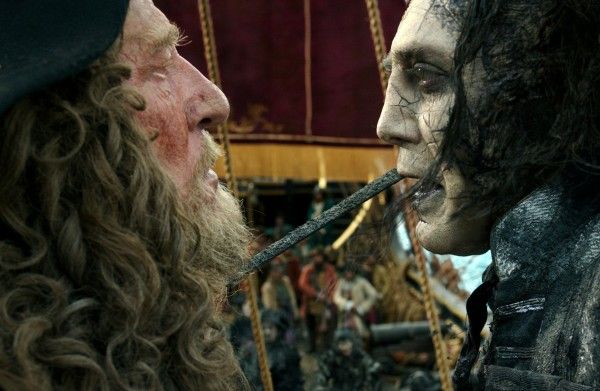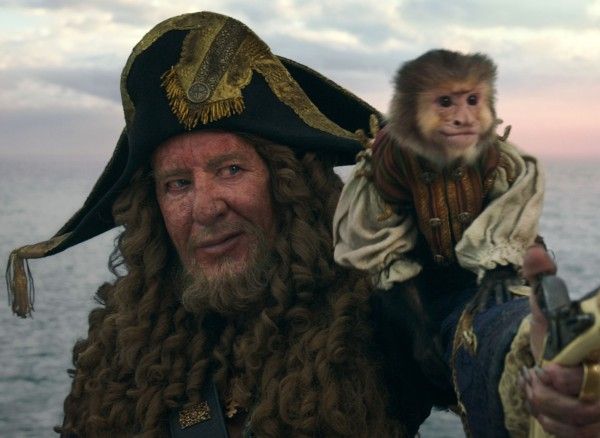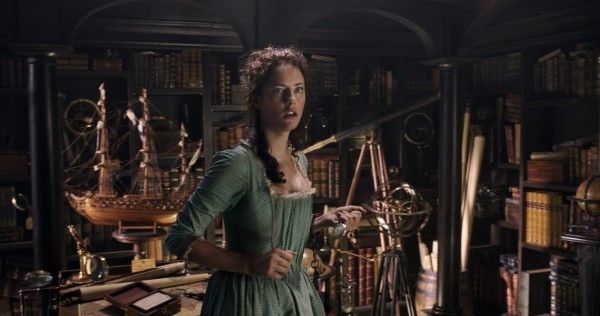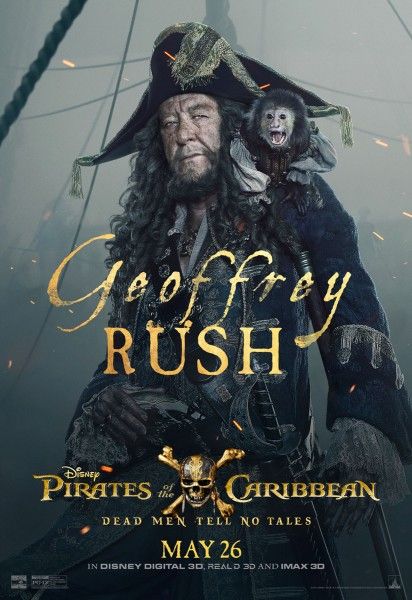From directors Joachim Rønning and Espen Sandberg and producer Jerry Bruckheimer, Pirates of the Caribbean: Dead Men Tell No Tales is the fifth installment in the hugely popular Pirates film franchise that blends fantasy, humor and action into a new tale involving Captain Jack Sparrow (Johnny Depp). This time around, the down-on-his-luck captain is being pursued by the terrifying Captain Salazar (Javier Bardem), who is hell-bent on killing Jack, and his only hope of survival is teaming up with a brilliant astronomer named Carina Smyth (Kaya Scodelario) and a young sailor named Henry (Brenton Thwaites) to recover the legendary Trident of Poseidon.
At the film’s press day, Academy Award-winning actor Geoffrey Rush, who returns as Captain Barbossa, spoke at a roundtable interview about why he enjoys the Pirates franchise so much, the desire to find pirate archetypes instead of stereotypes, being the movie’s emotional core, watching Javier Bardem work, and what he finds thrilling in an acting performance. He also discussed that big twist for his character and his fate going forward in the franchise. Be aware that major spoilers are discussed.
Question: What keeps you coming back to the Pirates franchise?
GEOFFREY RUSH: Right from the beginning, we always talked about how pirate films were a bit dead in the water, maybe since the ‘50s with Errol Flynn and Burt Lancaster, certainly as a populist film. There’s been The Princess Bride, and films like that. We were very low down on the summer release schedule. We were lost in the small print in the trades, under “This is what’s coming out, in the summer of 2003.” Jerry Bruckheimer timed it right. This was pre-Twitter and pre-social media. It really thrilling caught people’s imaginations, and I think part of that was the originality of how Johnny [Depp] led the company and created a pirate that had none of the traditional tropes. He does have a tangential, warped, absurd, creative mind, and he looked at the idea that they all drank rum and they were always in the sun. He said, “Geoffrey, man, their brains are fried!” And then, he talked about rock stars of the ‘60s and the flamboyant clothing. And he came up with this idea, which I thought was really, really clever, where he said, “In the script, sometimes I’m on boats and sometimes I’m on land, and I just want to play around with never getting my sea legs and land legs in order,” and that gave him so much scope. And with Barbossa not having a parrot, but having a monkey, we tried to find archetypes and not stereotypes. There was a bit more surprise. Johnny made Captain Jack more of a Jack Kerouac existential guy who rolls the dice and goes wherever. He’s a completely irreverent free spirit and Barbossa is a control freak, and they’re still fighting over the same ship, or their girlfriend, as it were. We were on the high seas, with the romance of that.
The film relies very heavily on the emotional connection between Barbossa and Carina. What was it like for you to be the emotional core of this movie?
RUSH: I went back and looked at the other films thinking, “Is this going to make sense?,” because we’re going back to the frat boy days, before the curse of the Black Pearl. I thought, “Maybe this has been a really seriously repressed, guilty memory that he’s buried and he kind of believes it never really happened.” And if that was the case, maybe by Pirates 2 or Pirates 3, I would have been in therapy. I thought maybe that’s where the monkey came from. It all made sense, and it didn’t feel like it was an easy dramatic device. I liked the idea that this smart, young scientific woman with rationale, knowledge and an aptitude for longitude, which it took ages to figure out how to do, he lets her guide the ship because he knows that she’s got superior smarts and that his days as a crusty old sea dog is fading. So, when Johnny is trusted up against the mast and teasing me, Hector says, “We’ll take this to our graves.” He had a line where he said, “I remember that night! We were in a tavern. It was an appalling sight, where you were naked and dancing on the table drunk.” It didn’t make it into the film, but I always loved that image of Jack and Hector, being wild boys in their youth, off their heads on rum, and then a child comes out of it.
What was your reaction to learning Barbossa’s fate, and do you truly believe that this is truly the end?
RUSH: I don’t know about the end of the franchise, but it’s certainly the end for me. I think it would undermine the impact that had on me and that it had on my own daughter, who was working on the film. She was so proud of me, being up on the anchor. It was great! And I think the notion of the selfless sacrifice would be cheapened, if you just suddenly went, “Well, we’ll bring him back because we had the score cards filled out and everybody says they like Barbossa.” They could come up with something, but I said to Jerry Bruckheimer, “I think this is the end for Barbossa.” It’s expanded the world dramatically. To lose an important character is good. Or he could come back like Hamlet’s father, as a ghost, and just annoy Jack with wisdom.
How was your experience of working with Javier Bardem?
RUSH: Now there is an example of somebody who dug so deeply into why Salazar was so vengeful. We did a lot of press together, in Shanghai and Paris for the junkets, and it was fascinating to hear him talk about it. It was not just rage and vengeance, but it was pain. That’s a good actor, thinking. And he was brilliant to watch, on set. We’d seen the pre-vis and the imagery, and we knew that half of the head would be missing and all of that hair, which is a bonus, would come in afterwards. I’d always play the scenes with him thinking, “You’re half-man, half-prawn, so you must smell something terrible.” I’d be acting in big dialogue scenes with him and think about that. We’d approach each other, and he’d have his crutches and I had my crutch and my wooden leg. It was like watching two crabs, about to fuck. It was like a dance of survival, with both brains. I was just hoping that I was getting into the side of his brain that had some rationale credibility because the other side was eaten out. It was strangely psychopathic. There are shots of him in that, that are quite haunting, of a former fully-rounded human being, in a state of tragic decay.
What do you see as the essentials for being a good actor?
RUSH: Wow, I don’t know. As an audience member, I like to be thrilled by performance virtuosity, and not in a show-off kind of way, but in a way where you know that the imagination of the performer you’re watching is gear-changing and thrilling you with a characterization that constantly shifts. That can give you revelatory moments, in your imagination. Some people are very good at being themselves and being very natural on screen, or being very sexy or handsome or whatever. I like that and I aspire towards that, but I don’t know if I always make it. I work very hard. I’m not a natural swordsman, and they’ve cut a lot of my sword fighting in this film, which is really annoying. He’s a survivor. He’s a strategist. To be in his 60s or 70s now, with those teeth and with that skin, he must be smart and he must be ruthless.
Pirates of the Caribbean: Dead Men Tell No Tales is currently playing in theaters.

